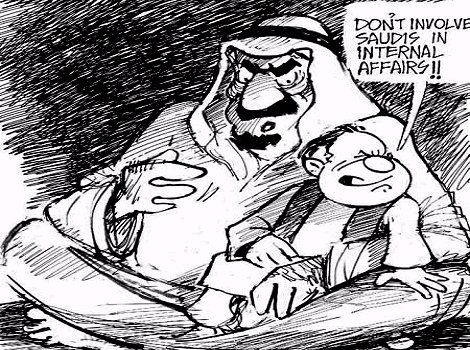M WAQAR..... "A man's ethical behavior should be based effectually on sympathy, education, and social ties; no religious basis is necessary.Man would indeed be in a poor way if he had to be restrained by fear of punishment and hope of reward after death." --Albert Einstein !!! NEWS,ARTICLES,EDITORIALS,MUSIC... Ze chi pe mayeen yum da agha pukhtunistan de.....(Liberal,Progressive,Secular World.)''Secularism is not against religion; it is the message of humanity.'' تل ده وی پثتونستآن
Wednesday, February 26, 2014
SAUDI’S SEEKING PAKISTANI ARMS AND SOLDIERS TO STRENGTHEN SYRIAN MILITANTS TO OUSTER ASAD
Saudi Arabia is in talks with Pakistan to provide foreign-backed militants operating inside Syria with anti-aircraft and anti-tank rockets to tip the balance in the war, to overthrow President Bashar al-Assad, a Saudi source said Sunday.
An unnamed Saudi source, who is close to decision-makers in the country, said on Sunday that Pakistan produces its own version of Chinese shoulder-launched anti-aircraft missiles, known as Anza, and anti-tank rockets, both of which Riyadh is planning to get for the militants.
“ Unnamed Sources further added that Saudi Arabia asked Islamabad to deploy 30 thousand Pakistani soldier on its territory, as part of a military agreement between the two countries may also include the sale of a Pakistani arms to Saudi Arabia for Syrian militants fighting against Asad government .”
The source referred to Pakistani army chief of staff General Raheel Sharif’s visit to Riyadh earlier this month during which he met Saudi Crown Prince Salman bin Abdul Aziz.
Prince Salman himself last week led a large delegation to Pakistan, shortly after Saudi’s chief diplomat Prince Saud al-Faisal visited the kingdom’s key ally.
The source further said that Jordan is set to provide facilities to store the arms before they are delivered to the militants within Syria.
Ahmad Jarba, the head of the so-called Syrian National Coalition (SNC), said last week during a visit to northern Syria that “powerful arms will be arriving soon.”
“The United States could allow their allies provide the rebels with anti-aircraft and anti-tank weapons following the failure of Geneva talks and the renewed tension with Russia,” said the head of the Gulf Research Centre, Abdel Aziz al-Sager.
Providing those weapons to the rebels “relieves pressure on the US in the short-term,” said Simon Henderson, director of the Gulf and Energy Policy Programme at the Washington Institue for Near East Policy.
“But the long-term political worry is that Manpads (Man-portable air-defence systems) will leak and be used to bring down a civilian airliner somewhere in the world.”
Rebels have long said that anti-aircraft rockets would help them defend themselves against Syrian warplanes, which regularly bomb rebel-held areas with barrels loaded with TNT and other ordinance.
Rising Saudi influence
Saudi Arabia has a strong influence on Syria’s southern front, where it coordinates with Jordan, and has helped unite the rebel fighters in the area, according to Syrian opposition sources.
On the other hand, Qatar and Turkey are responsible for coordinating with the rebels on the northern front, said an official of the Syrian opposition, requesting anonymity.
Saudi Arabia has come to eclipse Qatar as the main supporter of the Syrian rebels, a development illustrated by the election last July of Ahmad Jarba, who has strong Saudi links, to lead the Syrian National Coalition, the main umbrella opposition group.
The trend appeared to continue with the dismissal last week of General Selim Idriss, the top commander of the Western-backed Free Syrian Army, who was considered close to Qatar, according to an opposition source.
The main criticism of Idriss was “bad distribution of weapons” and “errors in battle,” said another opposition source.
Idriss, who has refused his dismissal, has been replaced by Brigadier General Abdel Ilah al-Bashir, the leader of the rebel military council for the region of Quneitra in southern Syria.
On its internal front, Saudi Arabia has sidelined intelligence chief Prince Bandar bin Sultan, who had been leading Riyadh’s efforts concerning Syria, according to a Western diplomat.
Diplomats have said that the file has been passed to the interior minister, Prince Mohammed bin Nayef, known for his successful crackdown on Al-Qaeda following a wave of deadly attacks in the kingdom between 2003 and 2006.
Bandar’s management had triggered American criticism, diplomats said.
The Saudi royal himself has criticized Washington for its decision not to intervene militarily in Syria, and for preventing its allies from providing rebels with much-needed weapons, diplomats added.
Citing Western and Arab diplomats as well as foreign-backed Syrian opposition sources, the Wall Street Journal reported on February 15 that Saudi Arabia has agreed to provide the foreign-backed militant groups in Syria with more sophisticated weaponry, including anti-aircraft shoulder-fired missiles.
A Western diplomat with knowledge of the weapons deliveries told the journal that “new stuff is arriving imminently.”
Meanwhile, the Syrian army has reportedly arrested more than 80 foreign officers and soldiers, mostly from Saudi spy services. The detainees are said to have entered Syria to carry out terrorist attacks.
Saudi Arabia has been the main supplier of weapons and funds to foreign-backed militants inside Syria.
Syria has been gripped by deadly violence since 2011. Over 130,000 people have reportedly been killed and millions displaced due to the unrest.


No comments:
Post a Comment